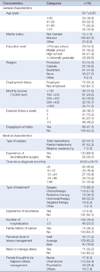Abstract
Purpose
This study was to describe the relationship between optimism and post-traumatic stress disorder (PTSD) in breast cancer patients.
Methods
The data were collected by self-administered questionnaires from March 5 to April 24, 2012. The participants included 204 breast cancer patients at K university hospital in D city. The utilized measurements were Life Orientation Test-revised (LOT-R) and Impact of Event Scale (IES).
Results
The mean scores of optimism and PTSD were 21.61±3.54 and 30.18±10.43, respectively. There were significant differences in the score of optimism by monthly income, engaging in a hobby, perceived level of stress management, need to manage stress, and people thought to be helpful in stress management. There were significant differences in the score of PTSD by engaging in a hobby, recurrence of cancer, the number of hospitalization, perceived level of stress management, need to manage stress, and people thought to be helpful in stress management. There was a negative correlation between optimism and PTSD.
Figures and Tables
References
1. 2012 annual report: National cancer registration statistics. Statistics Korea;Accessed June 30, 2013. http://kosis.kr/gen_etl.
2. Rohan TE, Jain M, Howe GR, Miller AB. Alcohol consumption and risk of breast cancer; a cohort study. Cancer Causes Control. 2000; 11:239–247.
3. Sammarco A, Konecny LM. Quality of life, social support, and uncertainty among Latino breast cancer survivors. Oncol Nurs Forum. 2008; 35(5):844–849.

4. American Psychiatric Association. Diagnostic and statistical manual of mental disorders. 4th ed. Washington, DC: American Psychiatric Association;2000.
5. Eitinger L. Organic and psychosomatic after-effects of concentration camp imprisonment. Int Psychiatry Clin. 1971; 8:205–215.
6. Vieweg WV, Julius DA, Fernandez A, Beatty-Brooks M, Hettema JM, Pandurangi AK. Posttraumatic stress disorder: clinical features, pathophysiology and treatment. Am J Med. 2006; 119:383–390.

7. Kessler RC, Sonnega A, Bromet E, Hughes M, Nelson CB. Posttraumatic stress disorder in the national comorbidity survey. Arch Gen Psychiatry. 1995; 52:1048–1060.

8. Treatment and Side Effect. Accessed June 30, 2013. http://www.breastcancer.org/treatment/side_effects/stress_disorder.
9. The Telegraph. Accessed May 20, 2012. http://www.telegraph.co.uk/health/healthnews/7691575/Half-of-breast-cancer-patients-suffer-symptoms-of-posttraumatic-stress-disorder.htm.
10. Mehnert A, Koch U. Prevalence of acute and post-traumatic stress disorder and comorbid mental disorders in breast cancer patients during primary cancer care: a prospective study. Psychooncology. 2007; 16:181–188.

11. Lazarus RS, Folkman A. Stress and coping: some current issue and controversies. New York: Columbia University Press;1984.
12. Scheier MF, Carver CS. Optimism, coping, and health: assessment and implications of generalized outcome expectancies. Health Psychol. 1985; 4(3):219–247.

13. Kim HY. A structural model for psychosocial adjustment in early breast cancer patients [dissertation]. Chonnam: Chonnam Univ.;2009.
14. Friedman LC, Kalidas M, Elledge R, Chang J, Romero C, Husain I, et al. Optimism, social support and psychosocial functioning among women with breast cancer. Psychooncology. 2006; 15:595–603.

15. Scheier MF, Carver CS, Bridges MW. Distinguishing optimism from neuroticism and trait anxiety, self-mastery, and self-esteem: a re-evaluation of the Life Orientation Test. J Pers Soc Psychol. 1994; 67:1063–1078.

16. Shin HS. Testing the mediating effect of coping in the relation of optimism and pessimism to psychological adjustment in adolescents. Korean J Youth Stud. 2005; 12(3):165–192.
17. Horowitz M, Wilner BA, Alvarez MA. Impact of event scale: a measure of subjective stress. Psychosom Med. 1979; 41:209–218.

18. Yi SM, Eun HJ. A study of reliability and validity on the Korean version of impact of event scale. J Korean Neuropsychiatr Assoc. 1999; 38(3):501–513.
19. Kim KH. A study on the optimism and coping styles in cancer patients [dissertation]. . Gangneung: Kwandong Univ.;2010.
20. Kang O. Effects of optimism and social support on adaptation of cancer patients [dissertation]. Suwon: Aju Univ.;2000.
21. Sung GH. The effect of optimism and repressive coping on satisfaction with life and depression of cancer patient's caregiver [dissertation]. Seoul: Korea Univ.;2009.
22. O'Connor M, Christensen S, Jensen AB, Moller S, Zachariae R. How traumatic is breast cancer? post-traumatic stress symptoms (PTSS) and risk factors for severe PTSS at 3 and 15 months after surgery in a nationwide cohort of Danish women treated for primary breast cancer. Br J Cancer. 2011; 104:419–426.
23. Woo HA. The relationship between multiple injury severity and posttraumatic stress severity for traffic accidents victims [dissertation]. Chonnam: Chonnam Univ.;2001.




 PDF
PDF ePub
ePub Citation
Citation Print
Print







 XML Download
XML Download